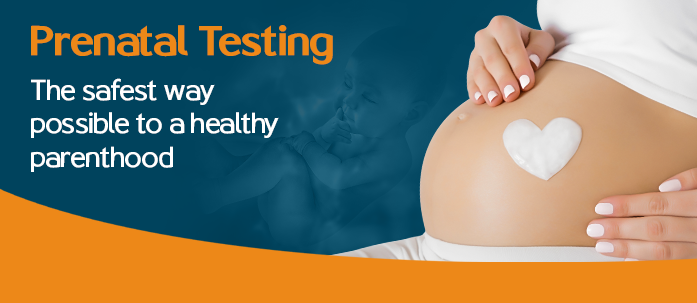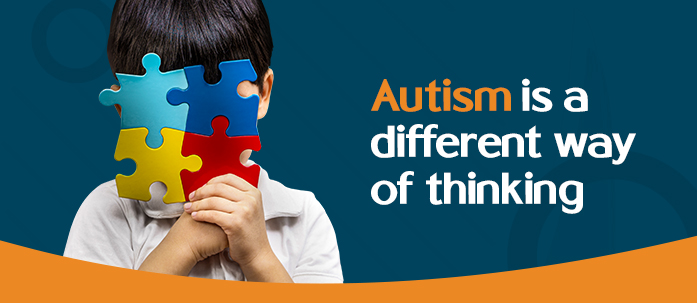Pregnancy is a time of great anticipatory anxiety! Parents are constantly worried about their unborn child’s health, especially in a country like India where the non-communicable diseases graph is increasing rapidly. The prevalence of birth defects in India is 64.4 per 1000 live births (1) with 25000- 29000 infants born with Down syndrome each year (2). These numbers threaten the present health infrastructure and socio-economic conditions of this developing nation.
Prenatal testing is the best possible way forward for any parent- as it screens and confirms your baby’s health in an early pregnancy stage.
Have more questions??? Read our blog to know everything about Prenatal Testing
Why Prenatal testing?
Congenital malformations and genetic disorders are significant contributors to newborn morbidity and mortality. Prenatal testing identifies these conditions in early pregnancy stages, giving parents a chance
- to take informed decisions to proceed with the pregnancy
- and/or prepare themselves for a baby that might have special needs
- Few conditions can be treated, prenatal testing gives opportunity to the clinicians to be prepared for afterbirth treatment procedures
American College of Obstetricians and Gynecologists (ACOG) recommended prenatal genetic screening and diagnostic testing options should be discussed and offered to all pregnant patients regardless of maternal age or risk of chromosomal abnormality.
Prenatal testing is not compulsion, people do have the right to pursue or decline prenatal genetic screening and diagnostic testing!
What are the different types of Prenatal testing available at Yoda diagnostics?
Types of Prenatal Testing
Prenatal testing includes screening and diagnostic tests that are recommended to identify the mother’s health and related risk of birth defects during pregnancy. A screening test reveals the possibility of a condition- if the results are positive- patients are recommended a couple of diagnostic tests for confirmation of the condition.
Screening tests include:
- First Trimester Screening Tests: During your first trimester, your healthcare provider will ask you to take – a blood sample test to check the levels of maternal serum markers (MSM) and an ultrasound scan to measure the size of the clear space in the tissue at the back of a baby’s neck (nuchal translucency). For conditions like Down syndrome, the MSM levels do not align with the normal range and nuchal translucency measurement is larger than usual.
- Second Trimester Screening Tests: During your second trimester, your healthcare provider will offer another blood test called the quad screen. These test results indicate your risk of carrying a baby who has certain chromosomal conditions and it can also help to detect neural tube defects such as serious abnormalities of the brain or spinal cord.
- Non-Invasive Prenatal Screening (NIPS): American College of Obstetricians and Gynecologists (ACOG) recommended NIPS should be offered as the first line of screening investigation to every pregnant women regardless of maternal age. This powerful technique examines the fetus’s cell-free prenatal DNA present in the maternal bloodstream. NIPT can be carried out from 9-10 weeks of gestation. This efficient method screens all the chromosomes at once increasing the chances of detecting specific chromosomal abnormalities.
Yoda offers NIPS and NIPS plus testing that investigate chromosomal abnormalities with efficient diagnosis of microdeletions if present

Diagnostic tests includes:
These tests are performed after the babies with suspected risk for chromosomal abnormality through initial screening. Invasive prenatal testing includes Amniotic fluid- AF (Amniocentesis) or chorionic villi samples- CVS (Placenta) diagnosis to investigate the hereditary or spontaneous genetic illnesses. The tests should be performed during the following time of gestation.
- CVS (11 and 12 weeks)
- AF (15 to 20 weeks)
Cytogenetics Tests: Prenatal cytogenetic analysis is used as an invasive confirmatory test to detect genetic abnormalities in prenatal. It includes routine conventional karyotyping and molecular cytogenetics such as FISH.
- Karyotyping – Uses chromosomal band staining to detect numerical and structural abnormalities.
- FISH – This method is popular for faster turnaround time (3-4 days) and is thus favorable for quicker clinical decisions. Uses highly-sensitive fluorescent-tagged targeted probes for the specific gene regions. This allows micro-scale fluorescence measurement to detect micro-scale aberration in chromosomes.
Molecular Tests:
- Chromosomal Microarray – Prenatal chromosomal microarray is a reliable genome-wide approach for high-throughput DNA copy number analysis to detect a number of genetic anomalies. This assay is a quick and accurate to identify micro-duplications, microdeletions, aneuploidies, and other types of chromosomal abnormalities in the entire genome.
This test diagnoses several genetic problems such as multiple congenital anomalies, intellectual disability, unexplained developmental delay, Syndromic or dysmorphic features, and autism spectrum disorders. - Targeted Sequencing (Sanger Sequencing) – This test is recommended by your healthcare provider when there is a proband history (medical history of previous children with genetic disorders) is available.

Why is prenatal testing important for mothers who opted for in vitro fertilization?
Preimplantation genetic testing (PGT) are especially important in – in vitro fertilization (IVF) cases to rule out any possibility of abnormalities occurring during the fertilization process. The remaining tests will be similar as mentioned above.
Why is prenatal testing performed at early stages?
If a baby is diagnosed with a genetic condition at a later stage, the possibility of treatment either to cure or manage the baby becomes brink. It is always recommended to have a detailed conversation with clinicians for opting early prenatal testing.
Is prenatal testing also helpful for mothers?
Yes, along with the child’s condition prenatal testing offers important insights into mothers’ health too that can affect her baby’s health:
- Blood type-important for understanding Rh compatibility
- If she has gestational diabetes or anemia
- Suffering from hypersensitivity or allergic reactions
- If she has an STD or cervical cancer
Why is prenatal testing beneficial?
For genetic carrier parent/parents, these tests bring forth the correct scenario pertaining to their child’s health. The test results help the parents and clinicians to make informed decisions related to pregnancy. In a few cases, there are genetic abnormalities present in the baby with no former family history, and the occurrence of spontaneous mutations in babies is efficiently tested with prenatal testing.
Takeaways from prenatal diagnostic testing
- These tests might help parents to be prepared if the baby has some genetic conditions and to continue with the pregnancy
- These tests also detect problems that can be treated during pregnancy
- These tests alert clinicians to a condition that requires immediate treatment required after babies birth
How should you trust Yoda diagnostics?
Yoda offers an efficient Prenatal screening and diagnosis that offers
- couple carrier screening for both pre-marital and married couples.
- greater insights into a couple’s genetic compatibility for a healthy pregnancy
- detailed study reports for complicated cases, such as miscarriages recurrent pregnancy loss and ectopic pregnancy
In addition we also offer;
- Highly accurate results with detection rates over 99% (Down Syndrome, Edwards Syndrome and Patau Syndrome)
- We have standardized bioinformatics pipeline to aid diagnostic testing
- Easy sample collection process by our phlebotomist
- Our genetic experts and genetic counselors are readily available for report analysis and consultations
India suffers from a high burden of genetic birth defects rate (3) due to occurrence of consanguinity marriage in many societies which embarks passage of hereditary disorders in later generations. Changing environmental conditions and sedentary lifestyle also contributes to de novo mutations during baby development. Opting for prenatal testing is the way forward!
#HealthyPregnancyWithYoda























